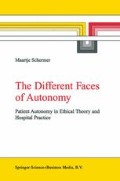Abstract
Ever since Kant, autonomy has been an important concept in philosophy. As a concept with a long history, it has been interpreted and developed in various ways over the years. Not surprisingly, then, autonomy is also a concept bearing many different connotations such as rationality, freedom, independence, self-determination and the like. For a proper understanding of any specific use of this concept, a certain amount of insight into its theoretical background is necessary. This chapter therefore discusses autonomy from a broader philosophical and ethical perspective, while the next chapter narrows the focus to the interpretation and role of autonomy in the field of medical ethics.
Access this chapter
Tax calculation will be finalised at checkout
Purchases are for personal use only
Preview
Unable to display preview. Download preview PDF.
References
Dworkin 1976,1981,1982,1988, Frankfurt 1971, Christman 1988,1989.
The problems mentioned here are extensively discussed in Christman 1988 and 1989.
While the split-level self model can be understood as a theory about the actual condition of autonomy, in his later work, Dworkin defines autonomy as a capacity. Following Feinberg’s analysis, it can be argued that there is a difference between possessing the capacity for critical reflection, and actually exercising it and making it effective in one’s life. In the former case, it seems more accurate to speak of the capacity for autonomy, while in the latter case, one can still speak of an actual condition of autonomy.
Agich’s theory originates in dissatisfaction with the way in which autonomy is understood in medical ethics, i.e., as a right to non-interference. He developed his theory on autonomy in the context of long-term care, for which he finds medical ethical theory especially unsuitable.
A similar idea is expressed by Ruddick (1999), who characterises autonomy as the capacity to lead a “chosen or embraced life”.
E.g. Manschot 1992,1994, ter Meulen 1994.
In the sense of some minimal capacity, autonomy is always a precondition for the right to make one’s own choices, simply because some minimal capacity is needed to make any choice at all.
According to some, this is a third category of value which is neither intrinsic nor instrumental (Rachels & Ruddick 1989). Here, however, it will be discussed under the heading of intrinsic value.
It is interesting to note that while a total slave can have no life, neither can someone who has absolute or total liberty (cf. Wijsbek 1996, Benn 1976, Dworkin 1988,21–22).
As Brock says, the ideal of the autonomous person offers “an attractive vision of what human beings can be” (1987,107).
See for instance: Buchanan (1978), Culver and Gert (1976, 1982), Feinberg (1980, 1986), Childress (1982), Brock (1983, 1988), Hershey (1985), VanDeVeer (1986).
Berghmans’ definition is a revised version of the definition developed by Hershey (1985).
Interesting and instructive in Hershey’s analysis is the comparison between paternalism and gift giving.
In formulating this second premise, Berghmans replaces Hershey’s ‘consent or dissent’ with “wishes, actions and choices”, a formulation he adopts from Childress. Berghmans does so in order to include in the definition instances of passive paternalism. Passive paternalism entails that the paternalist refuses to cooperate with the execution of the other person’s choices. In such cases, according to Berghmans, it is not a person’s consent or dissent that is under discussion, but a person’s wishes, choices or actions. An example of such passive paternalism is a physician who refuses to perform a sterilisation because he is of the opinion that this would harm the woman who requested it.
It is interesting to note here that theories of paternalism all focus on determining what makes a paternalistic action permissible, while little or no attention is paid to the question of what would make a paternalistic action morally imperative. In some situations, it seems as if refraining from a paternalistic action would require more justification than performing it.
The principles apply only to competent persons, a class that in VanDeVeer’s theory excludes only infants, the severely retarded, the severely demented, or comatose persons. For paternalism in relation to the class of incompetents, VanDeVeer develops a different line of argument.
Voluntary’ must supposedly be understood here as an absence of coercion or undue pressure by others.
An extensive analysis of Ulysses contracts is given by Berghmans (1992). He also concludes that they can justify paternalism (which in these situations is described by him as auto-paternalism).
First, it seems misleading to speak of consent, since the action that is ‘consented’ to has already taken place. Second, future consent can, in principle, be given at any time in the future. This means that as long as the person concerned has not given any ‘future consent’, the question of justification is unsolved, and if this person were to die without having given consent it would even become unsolvable. Culver and Gert presumably speak of ‘immediately forthcoming’ consent in order to prevent such situations, but it remains unclear as to what exactly counts as ‘immediately forthœming’. A third problem with future consent is that the paternalistic action itself can influence this consent. For example, if somebody were brainwashed against his will, allegedly for his own well-being, it is conceivable that he would ‘consent’ to this brainwashing in retrospect.
Ignoring or overruling a person’s fully autonomous or voluntary choices is called ‘hard’ or ‘strong’ paternalism.
As Feinberg puts it: “a trivial interference with sovereignty is like a minor invasion of virginity: the logic of each concept is such that a value is respected in its entirety or not at all” (1986, 94).
Author information
Authors and Affiliations
Rights and permissions
Copyright information
© 2002 Springer Science+Business Media Dordrecht
About this chapter
Cite this chapter
Schermer, M. (2002). Philosophical and Ethical Perspectives on Autonomy. In: The Different Faces of Autonomy. Library of Ethics and Applied Philosophy, vol 13. Springer, Dordrecht. https://doi.org/10.1007/978-94-015-9972-6_1
Download citation
DOI: https://doi.org/10.1007/978-94-015-9972-6_1
Publisher Name: Springer, Dordrecht
Print ISBN: 978-90-481-6161-4
Online ISBN: 978-94-015-9972-6
eBook Packages: Springer Book Archive

